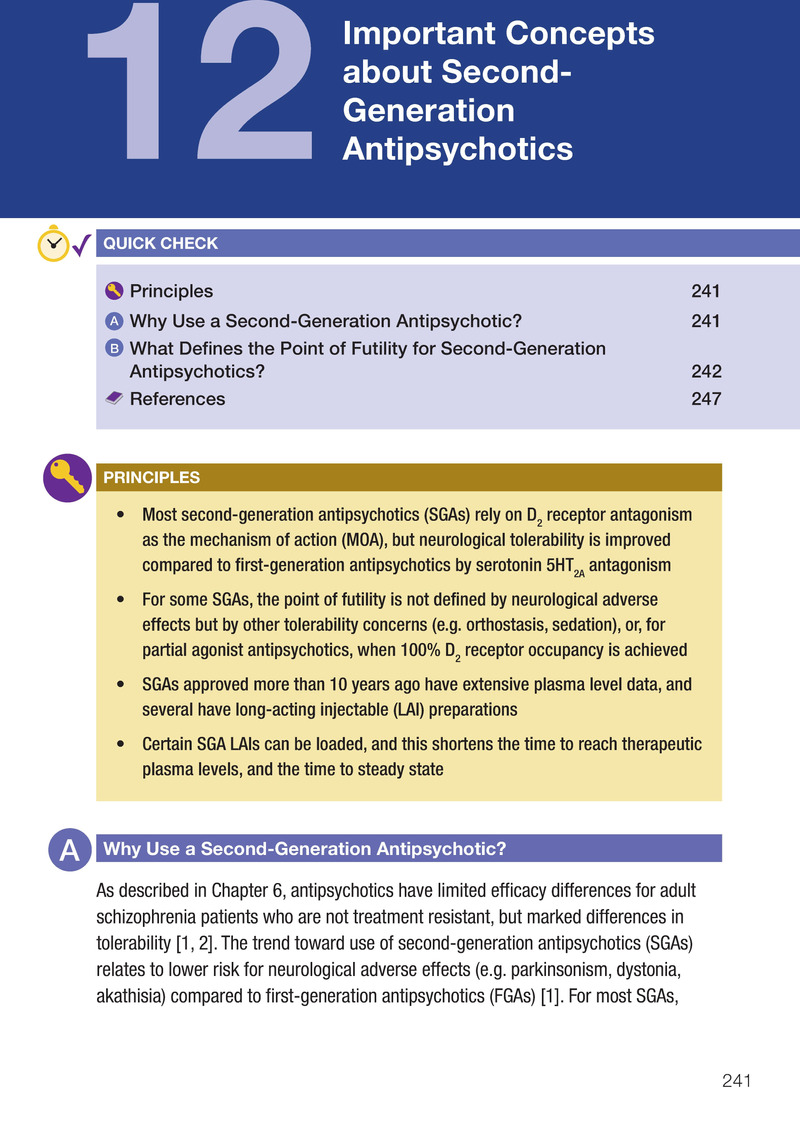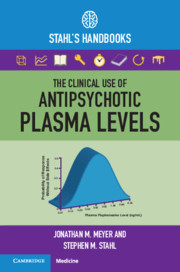Book contents
- The Clinical Use of Antipsychotic Plasma Levels
- Reviews
- The Clinical Use of Antipsychotic Plasma Levels
- Copyright page
- Half title page
- Contents
- Foreword
- Preface: How to Use This Handbook and Useful Tables for Handy Reference
- Introduction
- 1 Sampling Times for Oral and Long-Acting Injectable Agents
- 2 The Therapeutic Threshold and the Point of Futility
- 3 Level Interpretation Including Laboratory Reporting Issues, Responding to High Plasma Levels, Special Situations (Hepatic Dysfunction, Renal Dysfunction and Hemodialysis, Bariatric Surgery)
- 4 Tracking Oral Antipsychotic Adherence
- 5 What Is an Adequate Antipsychotic Trial? Using Plasma Levels to Optimize Psychiatric Response and Tolerability
- 6 Important Concepts about First-Generation Antipsychotics
- 7 Haloperidol and Haloperidol Decanoate
- 8 Fluphenazine and Fluphenazine Decanoate
- 9 Perphenazine and Perphenazine Decanoate
- 10 Zuclopenthixol and Zuclopenthixol Decanoate; Flupenthixol and Flupenthixol Decanoate
- 11 Chlorpromazine, Loxapine, Thiothixene, Trifluoperazine
- 12 Important Concepts about Second-Generation Antipsychotics
- Principles
- A Why Use a Second-Generation Antipsychotic?
- B What Defines the Point of Futility for Second-Generation Antipsychotics?
- Quick Check
- 13 Clozapine
- 14 Risperidone Oral and Long-Acting Injectable; Paliperidone Oral and Long-Acting Injectable
- 15 Olanzapine and Olanzapine Pamoate
- 16 Aripiprazole, Aripiprazole Monohydrate, and Aripiprazole Lauroxil
- 17 Amisulpride, Asenapine, Lurasidone, Brexpiprazole, Cariprazine
- Appendix Therapeutic Threshold, Point of Futility, AGNP/ASCP Laboratory Alert Level, and Average Oral Concentration–Dose Relationships
- Index
Quick Check
from 12 - Important Concepts about Second-Generation Antipsychotics
Published online by Cambridge University Press: 19 October 2021
- The Clinical Use of Antipsychotic Plasma Levels
- Reviews
- The Clinical Use of Antipsychotic Plasma Levels
- Copyright page
- Half title page
- Contents
- Foreword
- Preface: How to Use This Handbook and Useful Tables for Handy Reference
- Introduction
- 1 Sampling Times for Oral and Long-Acting Injectable Agents
- 2 The Therapeutic Threshold and the Point of Futility
- 3 Level Interpretation Including Laboratory Reporting Issues, Responding to High Plasma Levels, Special Situations (Hepatic Dysfunction, Renal Dysfunction and Hemodialysis, Bariatric Surgery)
- 4 Tracking Oral Antipsychotic Adherence
- 5 What Is an Adequate Antipsychotic Trial? Using Plasma Levels to Optimize Psychiatric Response and Tolerability
- 6 Important Concepts about First-Generation Antipsychotics
- 7 Haloperidol and Haloperidol Decanoate
- 8 Fluphenazine and Fluphenazine Decanoate
- 9 Perphenazine and Perphenazine Decanoate
- 10 Zuclopenthixol and Zuclopenthixol Decanoate; Flupenthixol and Flupenthixol Decanoate
- 11 Chlorpromazine, Loxapine, Thiothixene, Trifluoperazine
- 12 Important Concepts about Second-Generation Antipsychotics
- Principles
- A Why Use a Second-Generation Antipsychotic?
- B What Defines the Point of Futility for Second-Generation Antipsychotics?
- Quick Check
- 13 Clozapine
- 14 Risperidone Oral and Long-Acting Injectable; Paliperidone Oral and Long-Acting Injectable
- 15 Olanzapine and Olanzapine Pamoate
- 16 Aripiprazole, Aripiprazole Monohydrate, and Aripiprazole Lauroxil
- 17 Amisulpride, Asenapine, Lurasidone, Brexpiprazole, Cariprazine
- Appendix Therapeutic Threshold, Point of Futility, AGNP/ASCP Laboratory Alert Level, and Average Oral Concentration–Dose Relationships
- Index
Summary

- Type
- Chapter
- Information
- The Clinical Use of Antipsychotic Plasma LevelsStahl's Handbooks, pp. 241 - 248Publisher: Cambridge University PressPrint publication year: 2021

